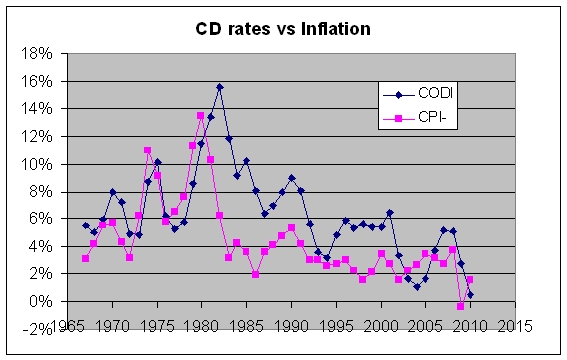In today’s low-interest-rate environment, finding a safe and reliable investment option that offers decent returns can be a challenging task. However, an increasing number of investors looking to save money for a short period of time are turning towards one-year certificates of deposit (CDs).
These financial products offer an attractive mix of stability, predictability, and yield, making them a sensible choice for many.
One of the most significant advantages of investing in a one-year CD is that it allows you to earn a higher interest rate than traditional savings accounts while providing a predictable return on investment. Additionally, CDs are insured by the FDIC up to $250,000 per account holder, which means that your principal investment is protected from market fluctuations and bank failures.

Another benefit of investing in a one-year CD is that it provides investors with the flexibility to access their principal and interest after a short period of time. This feature is particularly useful for those who are saving for a specific goal or planning a major purchase. Having access to your principal and interest in just 12 months gives you the freedom to make a planned purchase or to reinvest the money at that time.
In this article, we will explore three hypothetical scenarios involving a $1000 deposit in one-year certificates of deposit (CDs) that offer varying interest rates. These examples demonstrate how much money investors would earn upon maturity, depending on the yield earned by the CD.
The national average 1-year CD
The national average 1-year CD rate is the average annual percentage yield (APY) that banks and financial institutions offer to customers who invest in one-year certificates of deposit. As of April 2023, the national average APY for a 1-year CD is 1.68%. This rate can vary depending on the bank and location, but it provides a benchmark for investors to compare with other financial products.
If an investor deposits $1000 in a one-year CD with a 1.68% APY, they would earn approximately $16.80 in interest over the course of one year. At maturity, the total value of the CD would be $1,016.80, which includes the original principal amount plus the interest earned.
It’s important to note that the interest earned on a one-year CD with a 1.68% APY is subject to federal taxes. Depending on an individual’s tax bracket, a portion of the interest earned may be owed to the government.
Additionally, some banks may charge penalties for early withdrawals from a one-year CD.
The competitive 1-year CD rate
A competitive 1-year CD rate is a financial product that offers an above-average annual percentage yield (APY) for a one-year certificate of deposit. These types of CDs typically require a minimum opening deposit of $1,000, and the interest rate offered is higher than the national average for one-year CDs.
One example of a competitive 1-year CD rate is a product that offers a 5% APY. Assuming an initial deposit of $1,000, the CD would earn $50 in interest over the course of the one-year term. At maturity, the total value of the CD would be $1,050, which includes the initial deposit and the earned interest.
It’s important to note that competitive 1-year CD rates may not be offered by all financial institutions and may have certain requirements, such as minimum balances or restrictions on withdrawals.
1-year CD rates from big banks
When it comes to 1-year CD rates from big banks, the picture is not very appealing for savers. Large brick-and-mortar banks tend to offer much lower rates than their online competitors, with many offering rates that barely keep up with inflation.
For example, both JPMorgan Chase and Bank of America currently offer standard CDs of any term that earn just 0.01 percent APY and 0.03 percent APY respectively, which is hardly worth considering for most investors.
To put this into perspective, depositing $1000 in a one-year CD that earns a yield of 0.03 percent would only earn you around $0.30 in interest in the time the CD matures. This is a very small return on investment, especially when compared to the potential earnings offered by other financial institutions.
While big banks may offer convenience and security, their low CD rates make them a less attractive option for investors looking to grow their savings. It is important to shop around and compare rates from different financial institutions to find the best option for your needs.
Online banks, credit unions, and smaller regional banks often offer much more competitive rates, making them a better choice for savers who want to earn a higher return on their investment.
Exploring the Pros and Cons of a 1-year CD Investment Option

There are both pros and cons to consider before deciding if a 1-year CD is a right choice for you. Here are some of the main advantages and disadvantages of 1-year CDs:
Pros:
- Fixed interest rates: The interest rate on a 1-year CD is locked in for the entire term, which can provide predictability and stability for your investment.
- Low risk: 1-year CDs are typically insured by the FDIC up to $250,000, which means that they are considered a low-risk investment.
- Higher rates than savings accounts: While 1-year CDs typically have lower rates than longer-term CDs, they still tend to offer higher rates than savings accounts or checking accounts.
- Easy to open: Many banks and credit unions offer 1-year CDs that are easy to open online or in person.
Cons:
- Limited liquidity: Once you deposit money into a 1-year CD, you won’t be able to access your funds until the CD matures without paying an early withdrawal penalty.
- Lower rates than longer-term CDs: While 1-year CD rates are generally higher than savings account rates, they tend to be lower than rates offered on longer-term CDs.
- Opportunity cost: Because your funds are tied up in a 1-year CD, you may miss out on the opportunity to invest in other, higher-returning assets.
- Inflation risk: If inflation increases during the term of your 1-year CD, your interest earnings may not keep up with the rising cost of living.

Summary
To sum up, 1-year CDs provide a secure and predictable investment option for those seeking a fixed return over a specific period. There are several types of 1-year CDs available from various financial institutions, each with its own benefits and drawbacks.

Prior to investing in a 1-year CD, it’s vital to conduct thorough research and weigh up the options while considering factors such as liquidity, inflation risk, and interest rates.












